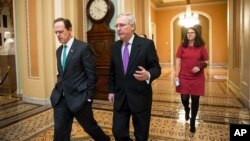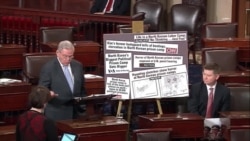One day after America’s top intelligence official warned of North Korea’s nuclear, ballistic and cyber capabilities, the U.S. Senate passed expansive sanctions targeting Pyongyang and its foreign suppliers and collaborators.
Wednesday’s 96 to 0 vote followed North Korea’s launch of a long-range rocket Sunday as well as a recent nuclear test.
Republican Bob Corker, chairman of the Senate Foreign Relations Committee, said decades of U.S. policy on North Korea have been “an abject failure,” and that tougher sanctions will provide a remedy.
“Our bill sets precedents and puts in place strong mandatory sanctions,” Corker said. “The president will be required to investigate a wide range of sanctionable conduct, including proliferation of weapons of mass destruction, arms-related materials, luxury goods, human rights abuses, activities undermining cybersecurity.”
Watch: U.S. Senators discuss North Korea sanctions.
The bill targets North Korea’s trade in minerals and other activities that generate hard currency for the regime, and penalizes Chinese and other entities that work with Pyongyang.
“We want to prevent commercial interests anywhere in the world from trying to help North Korea get the weapons and equipment and resources it needs in order to further its illegal weapon program,” said the committee’s top Democrat, Senator Ben Cardin.
For seven hours before the vote, a parade of senators from both political parties delivered speeches denouncing North Korea’s leadership.
“Extermination, murder, enslavement, torture, imprisonment, rape, forced abortions and unspeakable sexual violence are part of the ongoing story of this bizarre regime,” said Democrat Robert Menendez.
Many also expressed frustration with what they see as inaction by the United Nations and resistance by China to a robust international response.
“I am personally very disappointed at the way the U.N. Security Council is functioning,” Corker said.
“It is not enough to convene the U.N. Security Council for another round of hollow rhetoric that does nothing to the Kim regime but signal a lack of international commitment to enforcing international will,” Menendez said.
“The onus is now on China,” Cardin said. “China could make a huge difference in isolating North Korea and changing their behavior … They need to take action; they can’t be blocking U.N. Security Council action.”
Despite overwhelming bipartisan support for the legislation, some partisan sniping arose during floor debate. A few Republicans suggested North Korea and other U.S. adversaries have been emboldened by what they see as President Barack Obama's weak leadership on the world stage.
“Through his words and deeds, the president continues to discredit and undercut American leadership around the world, and as a result the world is even more unstable and conflict-ridden than when he [Obama] assumed office,” said Senator John Cornyn. “It is absolutely the fact that in the absence of American leadership, tyrants, thugs and bullies feel emboldened.”
The sanctions bill’s lead author, Republican Cory Gardner, said the president has been slow to confront Pyongyang.
“Strategic patience has been a strategic failure,” Gardner said. “All that our so-called patience has done is to allow the North Korean regime to continue to test nuclear weapons, to expand its testing of intercontinental ballistic missiles, to grow its military power, to develop cyber-warfare technologies, while systematically continuing to torture its own people.”
“We have neither militarily deterred this regime, nor effectively used our punitive tools,” he added.
Democrats noted that the failure to rein in North Korea extends back to the 1990s, covering both Democratic and Republican administrations.
“Whatever one’s views on various U.S. policy efforts of the past two decades, what has worked, what has not worked, there can be little question these efforts have failed to end North Korea’s nuclear ambitions or end its missile programs,” Menendez said. “They have failed to reduce the threat posed by North Korea to our allies, failed to alleviate the suffering of North Korea’s people, and failed to lead to greater security in the region.”
The Senate sanctions bill would have to be resolved with similar legislation already passed by the House of Representatives, unless the House passed the Senate version.
The State Department has endorsed tougher penalties on North Korea, but has declined to comment on specific legislation until a bill reaches President Obama’s desk.






